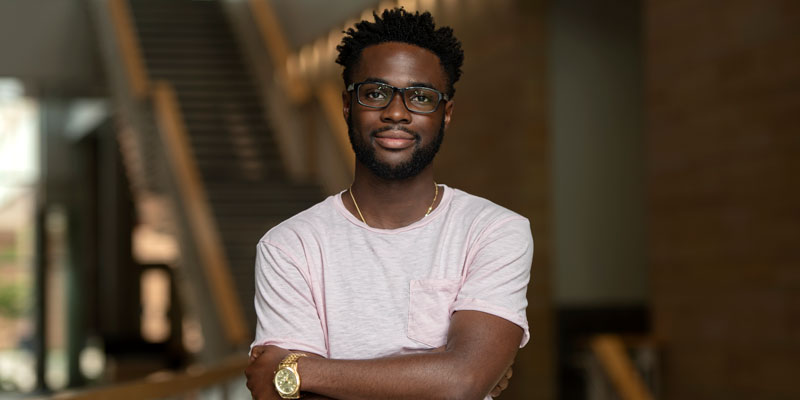CBS undergraduate Emmanuel Okematti receives award for work focused on increasing diversity in STEM and medicine.

Photo credit: Chris Cooper
Emmanuel Okematti has big plans as a future physician. He sees it not only as a chance to serve local communities as a doctor, but also to influence system-wide changes by encouraging fellow people of color to pursue careers in medicine and other STEM fields. He’s not waiting to finish medical school to get started. His efforts as an undergraduate in the College of Biological Sciences were recently earned him the Scholarly Excellence in Equity and Diversity award from the University of Minnesota.
“I want to increase patient trust in healthcare, particularly with minority patients,” he says. “I hope that being a physician of color would first and foremost increase trust in medicine from patients I may see, but at the same time inspire young children of color and let them understand that they are capable of being a physician too. This would increase the number of minorities in medicine and thus inciting more trust in medicine.”
This desire to increase representation in medicine and STEM is not only aspirational for Okematti. During his time as an undergraduate, he served as a peer mentor for the North Star STEM Alliance, a partnership between University of Minnesota campuses that aims to increase underrepresented students in STEM, for 18 months.
“I initially got involved in North Star STEM to find a sense of community with other underrepresented students in STEM,” says Okematti. “But as I got further involved in the program, I saw it was a way to help increase diversity in STEM fields that do not have a lot of diversity, including medicine.”
Beyond his work as a mentor, Okematti has volunteered at the Hennepin County Medical Center Emergency Department, coordinated an outreach program for students in Minneapolis schools to expose them to the University, researched in a faculty lab on campus and served on numerous student boards. These endeavors, along with his own personal experiences, helped Okematti see ways he hopes to make a broader impact as a physician.
“I hope to try my best to let my patients and other patients understand that I and other physicians care about them as individuals and not what brings them into the office,” he says. “I also hope to educate future colleagues and myself on ways to become more culturally competent while also learning our biases and how to reduce their impact on our interactions with patients.”
-Lance Janssen